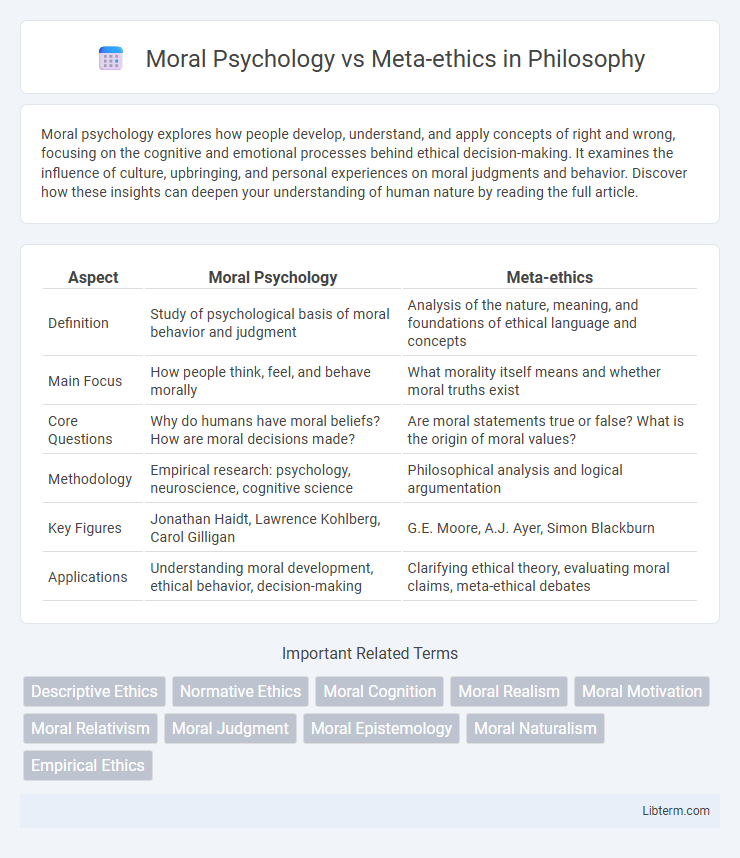Moral psychology explores how people develop, understand, and apply concepts of right and wrong, focusing on the cognitive and emotional processes behind ethical decision-making. It examines the influence of culture, upbringing, and personal experiences on moral judgments and behavior. Discover how these insights can deepen your understanding of human nature by reading the full article.
Table of Comparison
| Aspect | Moral Psychology | Meta-ethics |
|---|---|---|
| Definition | Study of psychological basis of moral behavior and judgment | Analysis of the nature, meaning, and foundations of ethical language and concepts |
| Main Focus | How people think, feel, and behave morally | What morality itself means and whether moral truths exist |
| Core Questions | Why do humans have moral beliefs? How are moral decisions made? | Are moral statements true or false? What is the origin of moral values? |
| Methodology | Empirical research: psychology, neuroscience, cognitive science | Philosophical analysis and logical argumentation |
| Key Figures | Jonathan Haidt, Lawrence Kohlberg, Carol Gilligan | G.E. Moore, A.J. Ayer, Simon Blackburn |
| Applications | Understanding moral development, ethical behavior, decision-making | Clarifying ethical theory, evaluating moral claims, meta-ethical debates |
Defining Moral Psychology and Meta-ethics
Moral psychology investigates how humans think, feel, and behave in moral contexts, emphasizing psychological processes underlying moral judgment, decision-making, and emotions. Meta-ethics analyzes the nature, origin, and meaning of moral concepts, focusing on questions about moral truth, objectivity, and the semantics of ethical language. Defining moral psychology centers on empirical study of moral cognition and behavior, while meta-ethics engages in philosophical inquiry about the foundations of morality itself.
Core Questions in Moral Psychology
Moral Psychology examines how individuals develop moral reasoning, emotions, and behavior, focusing on questions such as how people distinguish right from wrong and the psychological processes behind moral decision-making. Core questions include understanding the role of empathy, conscience, and social influences in moral judgment. Meta-ethics, in contrast, explores the nature and meaning of moral concepts, questioning the objectivity and truth of moral statements rather than the cognitive mechanisms studied by Moral Psychology.
Fundamental Issues in Meta-ethics
Moral psychology studies how people understand and experience morality through cognitive and emotional frameworks, while meta-ethics explores the nature, status, and foundations of moral values and language. Fundamental issues in meta-ethics include the objectivity of moral truths, the meaning of moral terms, and the possibility of moral knowledge, distinguishing between cognitivist and non-cognitivist theories. Debates over moral realism, relativism, and moral motivation reveal core tensions about whether moral statements express objective facts or subjective attitudes.
Distinguishing Normative and Descriptive Approaches
Moral psychology examines how individuals actually think, feel, and behave in moral contexts using descriptive approaches to understand cognitive processes and emotional responses. Meta-ethics analyzes the nature, meaning, and foundations of moral concepts through normative frameworks that assess the truth values and objectivity of moral judgments. Distinguishing these fields highlights the contrast between empirical investigation of moral behavior in moral psychology and philosophical inquiry into moral language and ontology in meta-ethics.
The Role of Emotion and Reason in Moral Psychology
Moral psychology investigates how emotions and cognitive processes influence moral judgment, emphasizing the interplay between affective responses and rational deliberation in ethical decision-making. Meta-ethics analyzes the nature and origin of moral values, questioning whether moral truths are objective or subjective without primarily focusing on emotional or cognitive mechanisms. Understanding the role of emotion and reason in moral psychology provides insights into how individuals experience and justify moral beliefs, differentiating it from the abstract, theoretical concerns of meta-ethics.
The Nature of Moral Truth in Meta-ethics
The nature of moral truth in meta-ethics explores whether moral statements correspond to objective facts or express subjective attitudes, with key theories including moral realism and anti-realism. Moral realism asserts that moral truths exist independently of human beliefs, whereas anti-realism denies such objective moral standards, emphasizing the role of language, culture, or individual perspectives. This distinction profoundly influences moral psychology by framing how people understand and justify moral judgments and behavior.
Intersections: Where Moral Psychology Meets Meta-ethics
Moral psychology examines how people actually think, feel, and behave in moral contexts, while meta-ethics analyzes the nature, origin, and meaning of moral concepts and language. The intersection between moral psychology and meta-ethics explores how empirical findings about human cognition and emotion influence theories about moral truth, objectivity, and motivation. This convergence helps clarify whether moral judgments are grounded in objective facts or shaped by psychological processes such as intuition, reasoning, and social emotions.
Methodologies Used in Moral Psychology vs Meta-ethics
Moral psychology employs empirical methodologies such as experiments, surveys, and neuroscientific techniques to study how humans actually think, feel, and behave in moral contexts. Meta-ethics relies on analytical and conceptual methods, focusing on logical analysis, language, and the nature of moral judgments rather than on empirical observation. The divergence between these methodologies highlights moral psychology's focus on descriptive understanding and meta-ethics' pursuit of normative and semantic clarity.
Key Debates: Objectivity, Relativism, and Moral Motivation
Moral psychology explores how individuals develop moral reasoning and the psychological mechanisms behind moral behavior, emphasizing empirical data on moral motivation and cognitive processes. Meta-ethics investigates the nature of moral judgments, focusing on debates about the objectivity or relativity of moral truths and whether moral statements express factual claims or emotional attitudes. Key discussions contrast moral objectivism, which asserts universal moral truths, with relativism, which argues moral standards vary across cultures, while moral psychology examines how internal and external factors drive ethical decision-making.
Contemporary Challenges and Future Research Directions
Moral psychology explores how humans actually think, feel, and behave in moral contexts, while meta-ethics analyzes the nature, scope, and meaning of moral judgments and language. Contemporary challenges include integrating empirical findings from neuroscience and social psychology into normative ethical theories and addressing the variability of moral intuitions across cultures. Future research directions emphasize cross-disciplinary collaborations to refine moral concepts, improve moral education, and develop AI systems that align with complex ethical paradigms.
Moral Psychology Infographic

 libterm.com
libterm.com